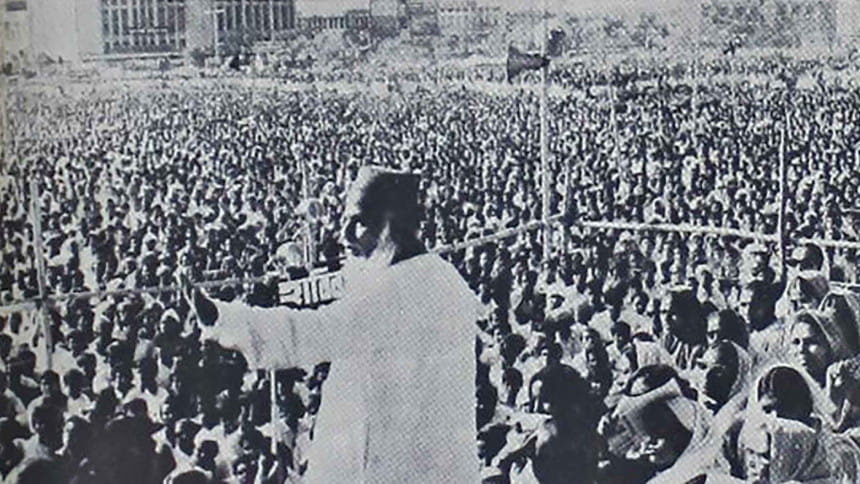Bhashani’s support for non-cooperation movement

March 9, 1971
'LA-KUM DEE-NU-KOOM WA LEE-YA DEEN'
Maulana Abdul Hamid Khan Bhashani addressed a mass gathering at Paltan Maidan on March 9. In his address, he proclaimed full support to the ongoing non-cooperation movement and called upon the people to continue the struggle unless success was achieved. He further stated that if the government does not accept Bangabandhu Sheikh Mujibur Rahman's demand by March 25, he would join hands with Bangabandhu and launch a mass movement.
Reciting the Quranic verse La-kum dee-nu-koom wa lee-ya deen (For you is your religion, and for me is my religion)Bhashani demanded that Yahya Khan accept the independence of East Bengal and thus, maintain a friendly relationship between the two wings of Pakistan. The Maulana accused Yahya of violating the basic norms of democracy by postponement of the National Assembly without consulting the majority party leader Sheikh Mujibur Rahman.
Earlier, after arriving in Dhaka from Santosh, Bhashani had a telephone conversation with Bangabandhu, and the two leaders discussed various aspects of the ongoing movement.
AYUB KHAN'S MYOPIA
Referring to the ongoing crisis in East Pakistan the former Pakistani military dictator Ayub Khan wrote in his diary (March 8, 1971), "In a confused situation like this, it is difficult to say what is the correct solution. The choice lies between so many evils. Some shooting might well be a lesson and more effective answer. This may sound hard hearted and callous, but a large majority of people who are law abiding are entitled to protection from the goondas which only the state can and must provide." [ Craig Baxter (ed.), Diaries of Field Marshal Mohammad Ayub Khan (1966-1972), UPL, 2007, pg. 462]
The retired dictator's assessment echoes the mind of the hawks in the Pakistan military establishment who opted for bullets to suppress Bangalees' victory in ballot.
BLACK FLAGS HOISTED
Black flags were hoisted atop private houses, educational institutions, business establishments and many offices in East Pakistan in protest of the firing during the ongoing movement. All means of transport also flew miniature black flags. People of all ages wore black ribbons.
Archer K Blood, the then consul general of the US Consulate in Dhaka, says Bangabandhu okayed the resumption of work on the Dhaka-Aricha road bridges by Vinnell-Zachary-Perini, an American-Canadian company, provided the company vehicles flew black flags. [Archer K Blood, The Cruel Birth of Bangladesh, UPL, 2006, pg. 183]
Tajuddin Ahmed issued new directives on behalf of Bangabandhu which permitted a selective revival of government services -- banks (9:00am to 12:30pm), EPWAPDA, EPADC, coal supply, food supply, post and telegraph office and so on. The police were asked to carry out duties of maintenance of law and order assisted, if necessary, by Awami League volunteers. The relief and rehabilitation work in cyclone-affected areas were also exempt from the non-cooperation ban. The secretariat, Supreme Court and High Court remain closed.
Commenting on this phase of non-cooperation, Rehman Sobhan wrote: "This [closure of government offices] however did not mean that all civil servants were sitting idle. They were carrying the struggle from its phase of non-cooperation to active cooperation with the Awami League. Groups of officials accepted the task of identifying problems and presenting them to Sheikh Mujib for decision. A sort of improvised secretariat was in operation where streams of businessmen and civil servants were visiting in search of solutions to problems, consultation and reassurance. The conditions of works were difficult, but decisions were being made and in many cases more rapidly than within the Eden Buildings." [ Forum, March 13, 1971]
Shamsuddoza Sajen is a journalist and researcher. He can be contacted at [email protected]

 For all latest news, follow The Daily Star's Google News channel.
For all latest news, follow The Daily Star's Google News channel. 



Comments